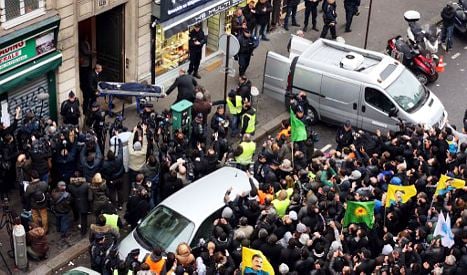The women were found in the early hours with gunshot wounds to the head and neck inside a Kurdish information centre in the 10th district of the French capital, police and the centre's director said.
Interior Minister Manuel Valls visited the scene of the crime and described the killings as "assassinations".
"Three women have been shot down, killed, without doubt executed. This is a very serious incident, which is why I am here. It is completely unacceptable," he told reporters.
Experts on the Kurdish movement in France said the killings could be the result of internal feuding in the PKK, personal score-settling, the work of Turkish agents or even of Turkish far-right extremists.
Hundreds of Kurds gathered on Thursday in front of the centre to protest at the deaths, with some chanting "We are all PKK!" and "Turkey assassin, Hollande complicit", referring to French President Francois Hollande.
The murders came after Turkish media reported Wednesday that the Turkish government and jailed PKK leader Abdullah Ocalan had agreed on a roadmap to end a three-decade-old insurgency that has claimed around 45,000 lives.
The PKK, listed as a terrorist organisation by Turkey and by much of the international community, has been fighting for Kurdish autonomy or independence in south-eastern Turkey since 1984.
One of the dead in the Paris centre was Sakine Cansiz, a founding member of the PKK, the Federation of Kurdish Associations in France said in a statement.
A US embassy report from April 2007 revealed on the Wikileaks website said that "US and Turkish officials had identified Cansiz as a priority PKK leader to bring to justice".
She was arrested in Berlin the same year but released after the German courts refused to extradite her to Turkey.
The second slain woman in Paris was said to be 32-year-old Fidan Dogan, an employee of the centre, who was also the Paris representative of the Brussels-based Kurdistan National Congress.
The third was Leyla Soylemez, described by the federation as a "young activist".
The three were last seen alive midday on Wednesday at the centre on the first floor of a building on Rue Lafayette, according to the centre's director, Leon Edart.
Friends and colleagues who tried and failed to contact them eventually went to the centre and found traces of blood on the door, which they then forced open to find the three bodies inside around 1am Thursday, said Edart.
Two of the women were shot in the neck while the third had wounds to her forehead and stomach, the Kurdish federation said.
French anti-terror police have opened a probe into the murders, officials said.
There are around 150,000 Kurds in France, the vast majority of them of Turkish origin.
French police in October detained a suspected European leader of the PKK and three other members of the group as part of a probe into terrorism financing and association with a terrorist group.
Turkish Prime Minister Recep Tayyip Erdogan in September accused France and Germany of obstructing Ankara's fight against the PKK.
Erdogan's government recently revealed that Turkish intelligence services had for weeks been talking to Ocalan, who has been held on the island prison of Imrali south of Istanbul since his capture in 1999.
Under the reported peace roadmap, the government would reward a ceasefire by granting wider rights to Turkey's Kurdish minority, whose population is estimated at up to 15 million in the 75-million nation.
The rebels also reportedly want the release of hundreds of Kurdish activists and the recognition of Kurdish identity in Turkey's new constitution.



 Please whitelist us to continue reading.
Please whitelist us to continue reading.
Member comments